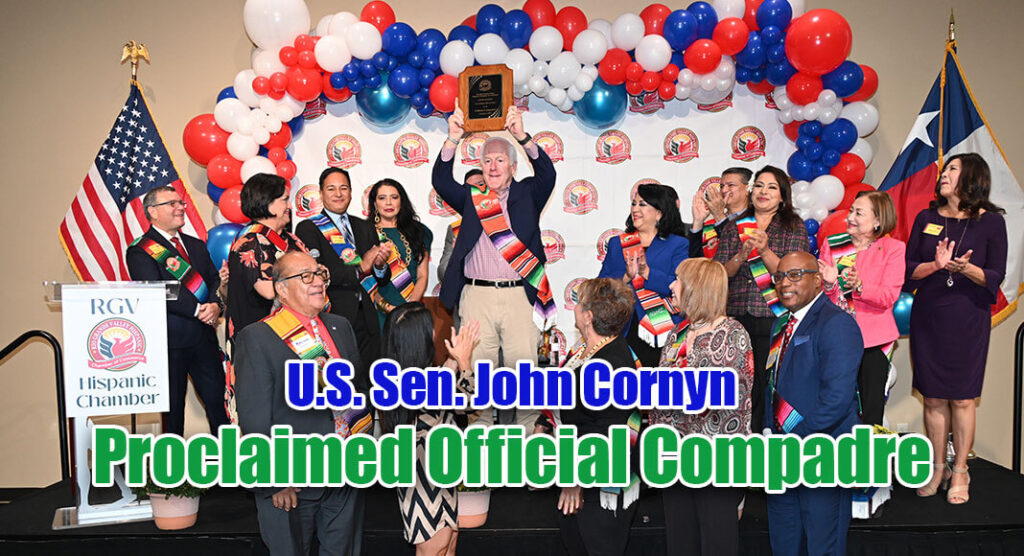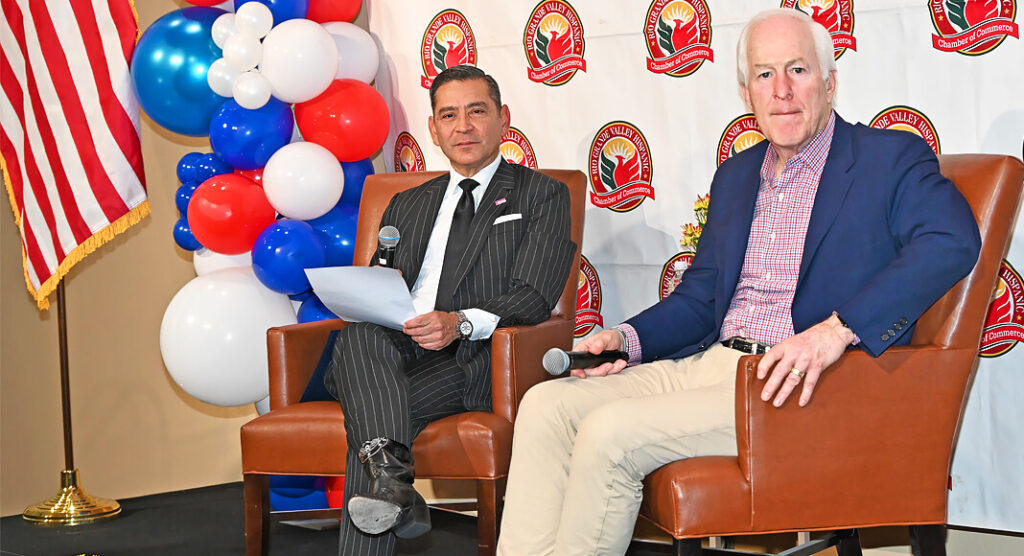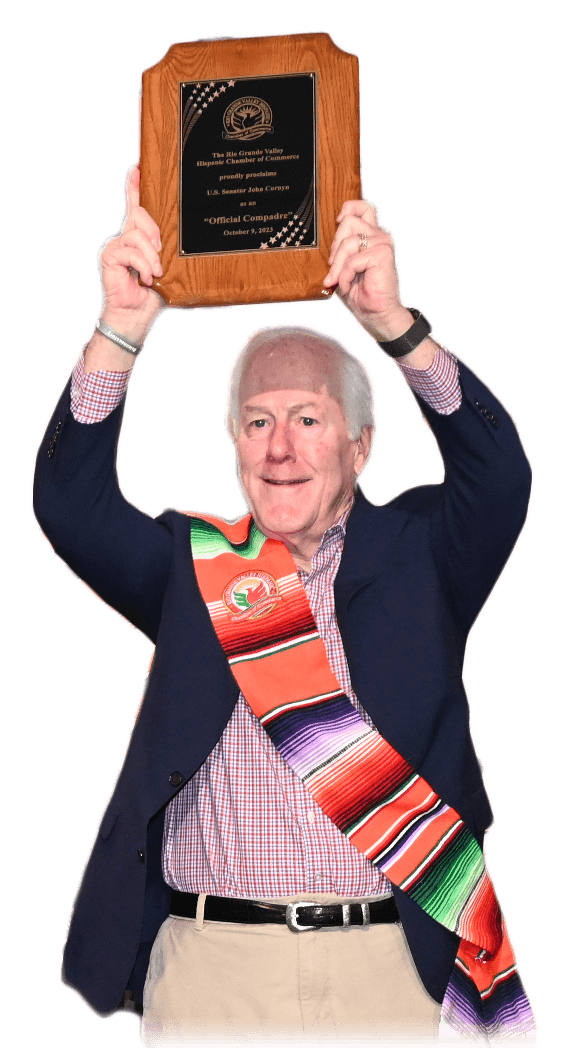
Texas Border Business
By Roberto Hugo González
October 9th marked a significant day for the residents and entrepreneurs of the Rio Grande Valley (RGV). The RGV Hispanic Chamber hosted a luncheon featuring U.S. Sen. John Cornyn at the DHR Event Center in Edinburg. With an array of critical topics for discussion, including transportation, infrastructure, economic development, education, border issues, and healthcare.
Julian Alvarez II, the Senior Vice President and Director of Business Development at Lone Star National Bank, moderated the event. With the gravity of the current socio-economic challenges being faced by the region and the nation, Alvarez didn’t hesitate to dig into one of the most pressing concerns: the economy.

“Senator, the Rio Grande Valley’s business community has weathered numerous challenges, from the grim days of the pandemic to business closures, supply chain hitches, and much more. We value your efforts in providing relief and alleviating the regulatory burden on our businesses. How do you perceive the state of our economic recovery? And are you optimistic about our current standing?” Alvarez probed.
Senator Cornyn’s response was both uplifting and candid. He began with a heartening declaration, asserting, “We have all won the lottery. We live in Texas!” He emphasized that Texas continues to be the nation’s economic dynamo, with people migrating from various parts of the country in search of opportunities and the American dream.
Yet, Cornyn did not shy away from addressing the challenges. He acknowledged the surge in inflation, describing it as a “silent tax” that affects everyone, from businesses to the average consumer. The Senator expressed his concerns about the federal government’s post-pandemic spending, especially on acts like the American Recoveries Act and what he termed the “Inflation Non-Reduction Act.” He questioned the allocation of federal funds and whether it was always in the best interest of the taxpayers.
However, he also voiced his optimism, lauding the growth and prosperity of educational institutions in the Rio Grande Valley. According to Cornyn, the region’s colleges and universities play a crucial role in fostering a competent workforce. He also celebrated the entrepreneurial spirit of the Valley, citing its significant advancements over the years.
Concluding his response, Senator Cornyn emphasized that while challenges persist, the Rio Grande Valley’s economy is an example for the rest of the nation.
This luncheon not only highlighted the pressing issues but also signified the collaborative spirit of the RGV community. With two more phases of discussion still to come, there is no doubt that this event will continue to drive forward meaningful dialogues for the betterment of the region.
With Alvarez steering the conversation, the focus shifted to the critical issue of labor shortages affecting a multitude of sectors, from hospitality to healthcare.
“Senator,” Alvarez began, “one of the most pressing challenges for many in this room has been the labor shortage. It’s affecting a range of industries and has ripple effects across the broader economy. With your visits to educational institutions across the region, what’s your sense of Washington’s perspective on this? What action can we anticipate?”
Senator Cornyn responded with commendation for Texas’s efforts in education and workforce development. He highlighted the seamless transition from high school to community colleges to four-year institutions, which has played a pivotal role in equipping students with skills without the burden of excessive debt.
“When it comes to the workforce, community colleges come to mind. Their collaboration with local employers to align courses with required skills has been commendably successful,” Senator Cornyn emphasized. However, he also acknowledged the social and psychological challenges brought about by the COVID-19 pandemic, which led to a workforce withdrawal. Whether it was due to early retirements or personal reasons, the shortage became more evident.
Cornyn then shifted his attention to the healthcare sector, lauding the collaborative efforts of institutions like the DHR and South Texas College in creating an apprenticeship program for nursing students. He identified healthcare as a sector in dire need of workforce development. As the population ages, the demands on the healthcare system increase, creating more opportunities but also challenges in areas like mental health treatment and professional caregiving.
“Addressing labor shortages is a multifaceted challenge,” Cornyn continued. “While a booming economy signals growth, it also highlights gaps in our workforce readiness. Federal workforce grants play a significant role, but much of the solution-oriented work occurs at the state level.”
Senator Cornyn’s emphasis on collaboration, both at the state and federal levels, as well as between educational institutions and employers, indicates the path forward. As the RGV Hispanic Chamber’s luncheon progressed, the need for proactive strategies in workforce development became even clearer, setting the stage for what promises to be an insightful final phase of discussions.
As border security continues to dominate national headlines, September was recorded as the busiest month for border crossings. Cornyn, renowned for his commitment to border and immigration issues, shared his perspective on the situation. The essence of Cornyn’s stance revolves around distinguishing between legal and illegal immigration. Emphasizing the significance of the former, he said, “Legal immigration has been a blessing to our country.” This process has enabled the U.S. to welcome the “best, brightest, and hardest working people” from around the world. However, the dark side of this narrative is the uncontested control of immigration systems by transnational criminal organizations or cartels.
One can understand the depth of this issue by examining the financial transactions involved. People pay significant sums to the cartels to gain access across the border. The result is an influx of 7 million people in recent years, including 1.5 million got aways. The negative implications extend beyond numbers. The unchecked border security is a gateway for dangerous substances like fentanyl – responsible for a staggering 71,000 American deaths in just the past year.
A striking revelation was that people seeking asylum aren’t just from Central America or Mexico. Senator Cornyn relayed a startling fact: “We encountered people from 147 different countries speaking more than 200 languages last year.” The broken asylum system allows individuals to claim asylum and await hearings that may be years away. Moreover, the lack of severe consequences for those not attending their hearings perpetuates the cycle.
The root of the issue is the lack of clear messaging about illegal immigration. He said, previous strategies, as highlighted by Secretary Chertoff’s experience during President George W. Bush’s tenure, focused on detaining and repatriating individuals, discouraging illegal entry.
Presently, however, the message appears to be more encouraging. Senator Cornyn advocates for a holistic approach to border security, emphasizing it as a “three-legged stool”: technology, personnel, and infrastructure. However, he warns against the dangers of oversimplifying solutions. For instance, a wall or fence, while part of the solution, cannot be the only answer.
In conclusion, the matter of border security is intricate and multifaceted. While the issue continues to resonate deeply with many, solutions must be rooted in comprehensive strategies, empathy, and an understanding of the larger picture. Senator Cornyn’s call for more senators to visit and understand the border firsthand is a testament to the importance of firsthand experience in shaping effective policies.
As migration continues to be a hot topic, its implications on legitimate trade and travel are profound. The moderator, highlighted the severe repercussions of mass crossings on border towns, resulting in significant disruptions. The closure of the Gateway International Bridge and more recently, the crossing at Eagle Pass, underscores the complexities of this issue. In response, Senator John Cornyn explains the intricate interplay between migration, security, and trade.
Cornyn emphasizes the importance of listening to the border communities. He said, “My father really drilled into my brain growing up… You need to learn to listen and particularly listen to the people who know it best.” The Senator believes that understanding the local challenges and listening to people directly affected is paramount for Congress to make informed decisions.
Speaking on the interrelation between legitimate trade, travel, and migration, Senator Cornyn acknowledges the shortcomings of the federal government. The delays in infrastructure development and technological enhancements at ports can lead to bottlenecks. But through collaborative ventures between local communities and the government, as initiated with Congressman Henry Cuellar and others, such challenges can be addressed.
Cornyn also drew attention to the larger global landscape. With escalating tensions between the US and China, there’s an opportunity for Mexico to play an even larger role in the US supply chain. Cornyn noted, “You’re now seeing a lot of the jobs that were in China now coming back to the United States… but what better place for them to go than to go to Mexico?” Yet, he also acknowledged the challenges Mexico faces due to organized crime, preventing it from realizing its full economic potential. Senator Cornyn emphasized the growing significance of the entire North American region – Mexico, the US, and Canada. He believes that addressing border security while promoting safe, humane immigration policies, and bolstering trade is crucial. As the region’s importance on the global stage amplifies, the solutions to these intertwined challenges must be sophisticated, comprehensive, and most importantly, based on mutual respect and understanding.














